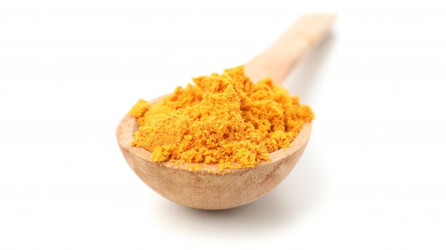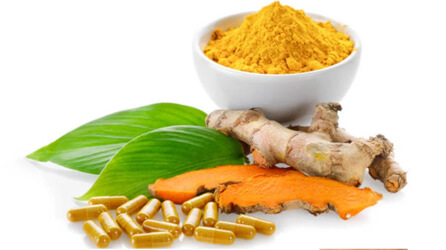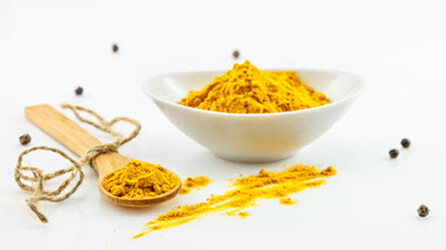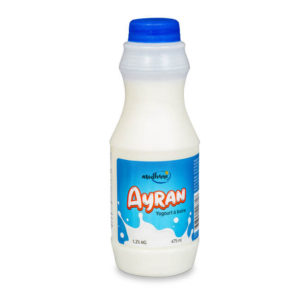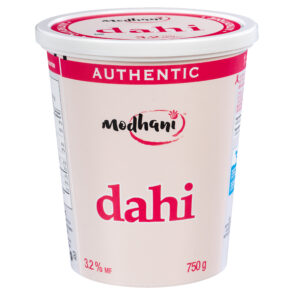Discover one of nature’s most effective nutritional supplements
TURMERIC 101
Traditionally known as ‘Indian saffron’ due to its deep yellow-orange color, turmeric is part of the same family of plants as ginger. Throughout history, people have used this tasty spice as a condiment, a healing remedy, and even a textile dye. It comes from the root of the Curcuma longa plant and is characterized by a rough brown exterior, a richly coloured orange flesh, and a very unique taste and aroma. Turmeric’s flavour is warm and spicy when raw, and it is used as a flavour and source of colour in such products as mustard.
THE RICH HISTORY OF TURMERIC
WHY EAT TURMERIC?
- Calcium
- Iron
- Magnesium
- Magnesium
- Niacin
- Potassium
- Protein
- Vitamins B6, C, E, and K
- Zinc
THE FOLLOWING ARE JUST SOME OF THE MANY PROVEN HEALTH BENEFITS ASSOCIATED WITH THIS
BRIGHT YELLOW SPICE:
1. Cancer prevention and treatment
Studies have linked the frequent intake of turmeric to lower rates of leukemia, breast, prostate, lung, and colon cancer. This is thanks to the phytonutrient Curcumin, which evidence suggests can prevent tumours from forming and help slow the spread of cancerous cells.
2. Anti-inflammatory
Turmeric is very helpful in managing the symptoms of chronic inflammatory diseases like osteoarthritis and rheumatoid arthritis. Those who consume it on a regular basis have been shown to experience noticeable relief from moderate to mild joint pain as well as joint inflammation.
3. Improves liver functioning
Turmeric acts as a natural liver detoxifier because it increases the production of vital enzymes, which break down and reduce toxins in the body. Turmeric also is believed to invigorate and improve blood circulation. All of these factors support stronger liver health.
4. Cardiovascular protection
Curcumin has beneficial effects on several factors known to play a role in heart disease. It helps improve the function of the endothelium, which is the lining of the blood vessels, and it also reduces inflammation and oxidation.
5. Lowers cholesterol
Research has proven that simply using turmeric as a food seasoning can reduce cholesterol levels.
6. Protects against Alzheimer's Disease and Dementia
Brain inflammation is suspected to be one of the leading causes of cognitive disorders. Turmeric supports overall brain health by aiding in the removal of plaque build-up in the brain and improving the flow of oxygen. It therefore boosts brain power and lowers risk of brain disease.
7. Antioxidant
Due to its chemical structure, Curcumin is a potent antioxidant that can neutralize free radicals and also block them from entering your body in the first place.
8. Antidepressant
Studies have shown that Curcumin has incredible benefits against depression. In one controlled trial, sixty patients were randomized into three groups. One group took Prozac, another group took a gram of Curcumin, and the third group took both Prozac and Curcumin. After six weeks, Curcumin had led to improvements that were similar to Prozac.
9. Weight management
Turmeric can be very helpful in maintaining an ideal body weight. A component present in turmeric helps increase the flow of bile, an important component in the breakdown of dietary fat. Those who wish to lose weight or treat obesity and other associated diseases can benefit from having one teaspoon of turmeric powder with every meal.
10. Controls diabetes
Turmeric helps moderate insulin levels, improves glucose control and increases the effect of medications used to treat diabetes. Another significant benefit is its effectiveness in helping reduce insulin resistance, which may prevent the onset of Type-2 diabetes.
As you can see, turmeric contains a wide range of antioxidant, antiviral, antibacterial, antifungal, anticarcinogenic, antimutagenic, and anti-inflammatory properties. It’s also a flavourful addition to many recipes and meals, including yogurt. There are many tasty ways you can add turmeric to your diet. Learn more about the uses and benefits of turmeric.
